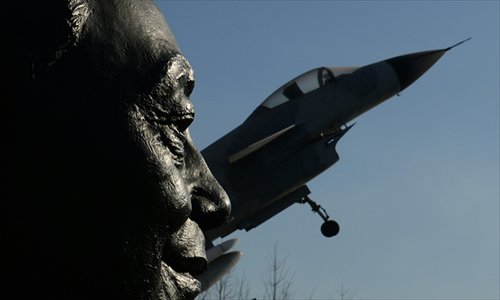Japan, S.Korea defy ADIZ

A statue of Wu Daguan (left), who is known as the father of China's military aviation industry, is displayed next to a Chinese produced J-10 fighter jet in Beijing on Thursday. Photo: AFP
Tensions over China's establishment of the Air Defense Identification Zone (ADIZ) over the East China Sea flared up on Thursday as aircraft of Japan and South Korea flew in the zone without informing China, following a similar US flight mission.
Tokyo said aircraft from its coast guard and military had flown unopposed in the zone without informing China of its flight plans as requested.
"We have been operating normal warning and patrol activities in the East China Sea including that area," said Japan's Chief Cabinet Secretary Yoshihide Suga on Thursday. "We have no intention of changing this."
South Korean military said on the same day that one of its planes had flown through the zone on Tuesday without informing China and the country would continue in this way.
Chinese defense ministry spokesman Yang Yujun Thursday said after a press conference that the Chinese military monitored all the aircraft that enter the zone and has full knowledge of them.
Meanwhile, Shen Jinke, spokesman for the People's Liberation Army Air Force, said China deployed an early-warning aircraft and several fighter jets to conduct a patrol mission in China's ADIZ on Thursday, adding that the air force has always been highly vigilant and will take measures in response to different levels of threat in the air to safeguard airspace security, China Central Television reported.
In response to Japanese Prime Minister Shinzo Abe's call for China to "retract" the setup of the zone earlier this week, Yang hit back and said Japan established its own ADIZ in 1969, therefore it has no right to make irresponsible remarks about China's zone.
"Should the decision be retracted, we ask the Japanese side to revoke its ADIZ first, we will then consider their demand 44 years later," Yang said.
It's clear that the US has made some coordination with Japan and South Korea for the defiant moves as the three countries have the same strategic interests against China, despite the historical disputes between Tokyo and Seoul, an air force expert, who requested anonymity, told the Global Times.
Amid the simmering tensions, Evan Medeiros, a senior director for Asian affairs at the US National Security Council, made an unofficial visit to Seoul recently to discuss China's ADIZ with the South Korean government, the Yonhap News Agency reported on Thursday.
After completing his visit to Seoul, Medeiros flew to Japan to discuss the ADIZ issue, the report said.
China's ADIZ is expected to top the agenda of a previously announced visit by US Vice President Joe Biden next week to China, Japan and South Korea.
Senior administration officials in Washington said on Wednesday that Biden plans to raise Washington's "concerns" about the zone during his upcoming visit to Beijing.
The further defiance from Japan and South Korea has triggered heated words from Chinese Net users on the Sina Weibo social network, with many saying that Chinese authorities should take aggressive action.
Zhu Feng, a professor of international relations at Peking University, told the Global Times that China's response is not as weak as Net users say and they may look at the conflict without thinking about the possible consequences if China acts more aggressively.
"While the establishment of the zone is in line with international practices, China's move has been magnified in the region as a response to China's rise. In this case China has to keep calm and give some time for this to pass," Zhu said.
Chinese authorities have repeatedly emphasized that the zone does not target any specific country and will not interfere with the normal flights of aircraft, but Australia on Thursday refused to back down from criticism of the air zone after summoning China's ambassador earlier this week, which invited an angry response from Beijing.
The Philippines also voiced concern that China may extend control of air space over disputed areas of the South China Sea.
Su Hao, director of the Asia-Pacific Research Center at the China Foreign Affairs University (CFAU), told the Global Times that China should take a more hard-line position toward the US and Japan than other countries but still keep open lines of communication.
"Current conflicts must be addressed through negotiations to avoid escalation of them. It's necessary to have more communication with the US and let it know that China acknowledges its key role in the Asia-Pacific region," Li Haidong, an international relations professor also at the CFAU, told the Global Times.
Agencies contributed to this story